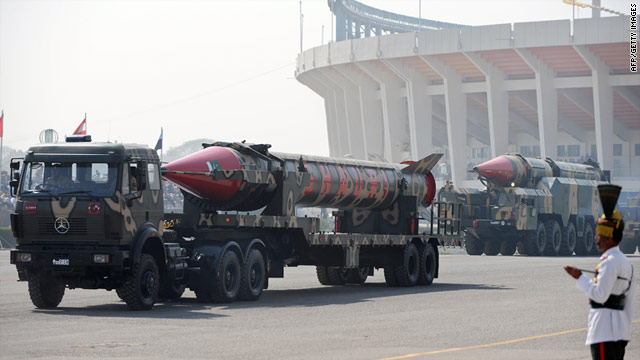Worried that Islamist extremists could seize components of Pakistan’s nuclear stockpile or trigger a war with India, the US has ramped up its surveillance of Islamabad’s nuclear arms, the Washington Post reported on Tuesday.
Worried that Islamist extremists could seize components of Pakistan’s nuclear stockpile or trigger a war with India, the US has ramped up its surveillance of Islamabad’s nuclear arms, the Washington Post reported on Tuesday.
Besides Al Qaeda, North Korea and Iran, Pakistan is the subject of “an equally intense focus” of a $52.6-billion US intelligence arsenal, the Post reported citing disclosures based on top secret budget documents provided to it by former intelligence contractor Edward Snowden.
“No other nation draws as much scrutiny across so many categories of national security concern,” it said, citing a 178-page summary of the US intelligence community’s “black budget”.
Pakistan’s foreign ministry allayed American fears.
It said Pakistan had set up extensive physical protection measures, robust command institutions, and effective export controls regulatory regimes to ensure the safety and security of nuclear installations and materials.
“We follow best international practices and standards set by the International Atomic Energy Agency,” Xinhua quoted a ministry statement as saying.
The summary shows “the US has ramped up its surveillance of Pakistan’s nuclear arms, cites previously undisclosed concerns about biological and chemical sites there, and details efforts to assess the loyalties of counter-terrorism sources recruited by the CIA.
“Pakistan appears at the top of charts listing critical US intelligence gaps. It is named as a target of newly formed analytic cells,” the daily said.
“And fears about the security of its nuclear programme are so pervasive that a budget section on containing the spread of illicit weapons divides the world into two categories: Pakistan and everybody else.”
US intelligence agencies were focused on two particularly worrisome scenarios, the Post said.
First is the possibility that Pakistan’s nuclear facilities might come under attack by Islamist militants, as its army headquarters in Rawalpindi did in 2009.
Second is an “even greater concern that Islamist militants might have penetrated the ranks of Pakistan’s military or intelligence services, putting them in a position to launch an insider attack or smuggle out nuclear material”, it said.
“Concerns persist that extremists could seize components of the stockpile or trigger a war with neighbouring India.
“Pakistan also has a track record of exporting nuclear technology to countries that are on Washington’s blacklist,” the Post reported.
“US anxiety over Pakistan’s nuclear programme appears to be driven more by uncertainty about how it is run than specific intelligence indicating that its systems are vulnerable,” it said.
The budget documents indicate that US intelligence agencies were also focused on the security of the nuclear programme in India, the Post said, but gave no other details.
US surveillance of Pakistan extends far beyond its nuclear programme. There are several references in the black budget to expanding US scrutiny of chemical and biological laboratories.
The country is not thought to be running a rogue chemical or biological weapons programme, but US intelligence officials fear that Islamists could seize materials from government-run laboratories, the Post said.
The budget documents do not break down expenditures by country or estimate how much the US government spends to spy on Pakistan.
But Pakistan is at the centre of two categories – counter-terrorism and counter-proliferation – that together accounted for nearly half of the US intelligence community’s budget request for fiscal 2013.
US spy agencies have sought $16.6 billion to fight Al Qaeda and other terrorist groups and sought $6.86 billion to counter the spread of nuclear, biological and chemical weapons, the Post said.
-IANS





